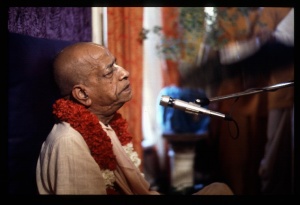CC Madhya 6.95 (1975): Difference between revisions
(Vanibot #0027: CCMirror - Mirror CC's 1996 edition to form a basis for 1975) |
(Vanibot #0020: VersionCompareLinker - added a link to the Version Compare feature) |
||
| Line 2: | Line 2: | ||
<div style="float:left">'''[[Sri Caitanya-caritamrta (1975)|Śrī Caitanya-caritāmṛta (1975)]] - [[CC Madhya (1975)|Madhya-līlā]] - [[CC Madhya 6 (1975)|Chapter 6: The Liberation of Sārvabhauma Bhaṭṭācārya]]'''</div> | <div style="float:left">'''[[Sri Caitanya-caritamrta (1975)|Śrī Caitanya-caritāmṛta (1975)]] - [[CC Madhya (1975)|Madhya-līlā]] - [[CC Madhya 6 (1975)|Chapter 6: The Liberation of Sārvabhauma Bhaṭṭācārya]]'''</div> | ||
<div style="float:right">[[File:Go-previous.png|link=CC Madhya 6.94 (1975)|Madhya-līlā 6.94]] '''[[CC Madhya 6.94 (1975)|Madhya-līlā 6.94]] - [[CC Madhya 6.96 (1975)|Madhya-līlā 6.96]]''' [[File:Go-next.png|link=CC Madhya 6.96 (1975)|Madhya-līlā 6.96]]</div> | <div style="float:right">[[File:Go-previous.png|link=CC Madhya 6.94 (1975)|Madhya-līlā 6.94]] '''[[CC Madhya 6.94 (1975)|Madhya-līlā 6.94]] - [[CC Madhya 6.96 (1975)|Madhya-līlā 6.96]]''' [[File:Go-next.png|link=CC Madhya 6.96 (1975)|Madhya-līlā 6.96]]</div> | ||
{{CompareVersions|CC|Madhya 6.95|CC 1975|CC 1996}} | |||
{{RandomImage}} | {{RandomImage}} | ||
==== TEXT 95 ==== | ==== TEXT 95 ==== | ||
<div class="verse"> | <div class="verse"> | ||
:ataeva | :ataeva 'tri-yuga' kari' kahi viṣṇu-nāma | ||
:kali-yuge avatāra nāhī, | :kali-yuge avatāra nāhī,--śāstra-jñāna | ||
</div> | </div> | ||
| Line 18: | Line 17: | ||
<div class="synonyms"> | <div class="synonyms"> | ||
ataeva—therefore; tri-yuga—the Lord, who appears in three yugas only; | ataeva—therefore; tri-yuga—the Lord, who appears in three yugas only; kari'-making; kahi—we say; viṣṇu-nāma—the holy name of Lord Viṣṇu; kali-yuge—in the Age of Kali; avatāra—incarnation; nāhi—there is not; śāstra-jñāna—the verdict of the scriptures. | ||
</div> | </div> | ||
| Line 25: | Line 24: | ||
<div class="translation"> | <div class="translation"> | ||
"Another name for Lord Viṣṇu is Triyuga because there is no incarnation of Lord Viṣṇu in Kali-yuga. Indeed, this is the verdict of revealed scriptures." | |||
</div> | </div> | ||
| Line 32: | Line 31: | ||
<div class="purport"> | <div class="purport"> | ||
The Supreme Personality of Godhead, Lord Viṣṇu, is known as Triyuga, which means that He is manifest in three yugas. However, this means that in the Age of Kali the Lord appears not directly but in disguise. This is confirmed in Śrīmad-Bhāgavatam ([[SB 7.9.38]]): | The Supreme Personality of Godhead, Lord Viṣṇu, is known as Triyuga, which means that He is manifest in three yugas. However, this means that in the Age of Kali the Lord appears not directly but in disguise. This is confirmed in Śrīmad-Bhāgavatam ([[SB 7.9.38|7.9.38]]): | ||
::itthaṁ nṛ-tiryag-ṛṣi-deva-jhaṣāvatārair | |||
::lokān vibhāvayasi haṁsi jagat-pratīpān | |||
::dharmaṁ mahā-puruṣa pāsi yugānuvṛttaṁ | |||
::channaḥ kalau yad abhavas tri-yugo 'tha sa tvam | |||
"My Lord, You kill all the enemies of the world in Your multifarious incarnations in the families of men, animals, demigods, ṛṣis, aquatics and so on. Thus You illuminate the worlds with transcendental knowledge. In the Age of Kali, O Mahāpuruṣa, You sometimes appear in a covered incarnation. Therefore You are known as Triyuga [one who appears in only three yugas].") | |||
::Śrīla Śrīdhara Svāmī has also verified that Lord Viṣṇu appears in the Age of Kali but does not act as He does in other ages. Lord Viṣṇu incarnates for two purposes: paritrāṇāya sādhūnāṁ vināśāya ca duṣkṛtām. That is, He comes to engage in pastimes with His devotees and to annihilate the demons. These purposes are visible in the Satya, Tretā and Dvāpara yugas, but in Kali-yuga the Lord appears disguised. He does not directly kill demons and give protection to the faithful. Because the Lord is not directly perceived in Kali-yuga but is directly known in the other three yugas, His name is Triyuga. | |||
Śrīla Śrīdhara Svāmī has also verified that Lord Viṣṇu appears in the Age of Kali but does not act as He does in other ages. Lord Viṣṇu incarnates for two purposes: paritrāṇāya sādhūnāṁ vināśāya ca duṣkṛtām | |||
</div> | </div> | ||
Latest revision as of 19:12, 27 January 2020

A.C. Bhaktivedanta Swami Prabhupada
TEXT 95
- ataeva 'tri-yuga' kari' kahi viṣṇu-nāma
- kali-yuge avatāra nāhī,--śāstra-jñāna
SYNONYMS
ataeva—therefore; tri-yuga—the Lord, who appears in three yugas only; kari'-making; kahi—we say; viṣṇu-nāma—the holy name of Lord Viṣṇu; kali-yuge—in the Age of Kali; avatāra—incarnation; nāhi—there is not; śāstra-jñāna—the verdict of the scriptures.
TRANSLATION
"Another name for Lord Viṣṇu is Triyuga because there is no incarnation of Lord Viṣṇu in Kali-yuga. Indeed, this is the verdict of revealed scriptures."
PURPORT
The Supreme Personality of Godhead, Lord Viṣṇu, is known as Triyuga, which means that He is manifest in three yugas. However, this means that in the Age of Kali the Lord appears not directly but in disguise. This is confirmed in Śrīmad-Bhāgavatam (7.9.38):
- itthaṁ nṛ-tiryag-ṛṣi-deva-jhaṣāvatārair
- lokān vibhāvayasi haṁsi jagat-pratīpān
- dharmaṁ mahā-puruṣa pāsi yugānuvṛttaṁ
- channaḥ kalau yad abhavas tri-yugo 'tha sa tvam
"My Lord, You kill all the enemies of the world in Your multifarious incarnations in the families of men, animals, demigods, ṛṣis, aquatics and so on. Thus You illuminate the worlds with transcendental knowledge. In the Age of Kali, O Mahāpuruṣa, You sometimes appear in a covered incarnation. Therefore You are known as Triyuga [one who appears in only three yugas].")
- Śrīla Śrīdhara Svāmī has also verified that Lord Viṣṇu appears in the Age of Kali but does not act as He does in other ages. Lord Viṣṇu incarnates for two purposes: paritrāṇāya sādhūnāṁ vināśāya ca duṣkṛtām. That is, He comes to engage in pastimes with His devotees and to annihilate the demons. These purposes are visible in the Satya, Tretā and Dvāpara yugas, but in Kali-yuga the Lord appears disguised. He does not directly kill demons and give protection to the faithful. Because the Lord is not directly perceived in Kali-yuga but is directly known in the other three yugas, His name is Triyuga.